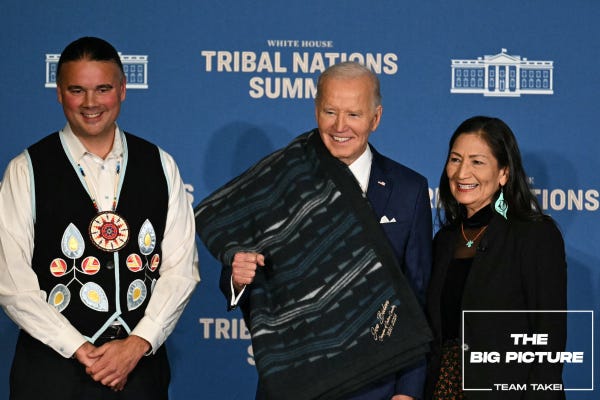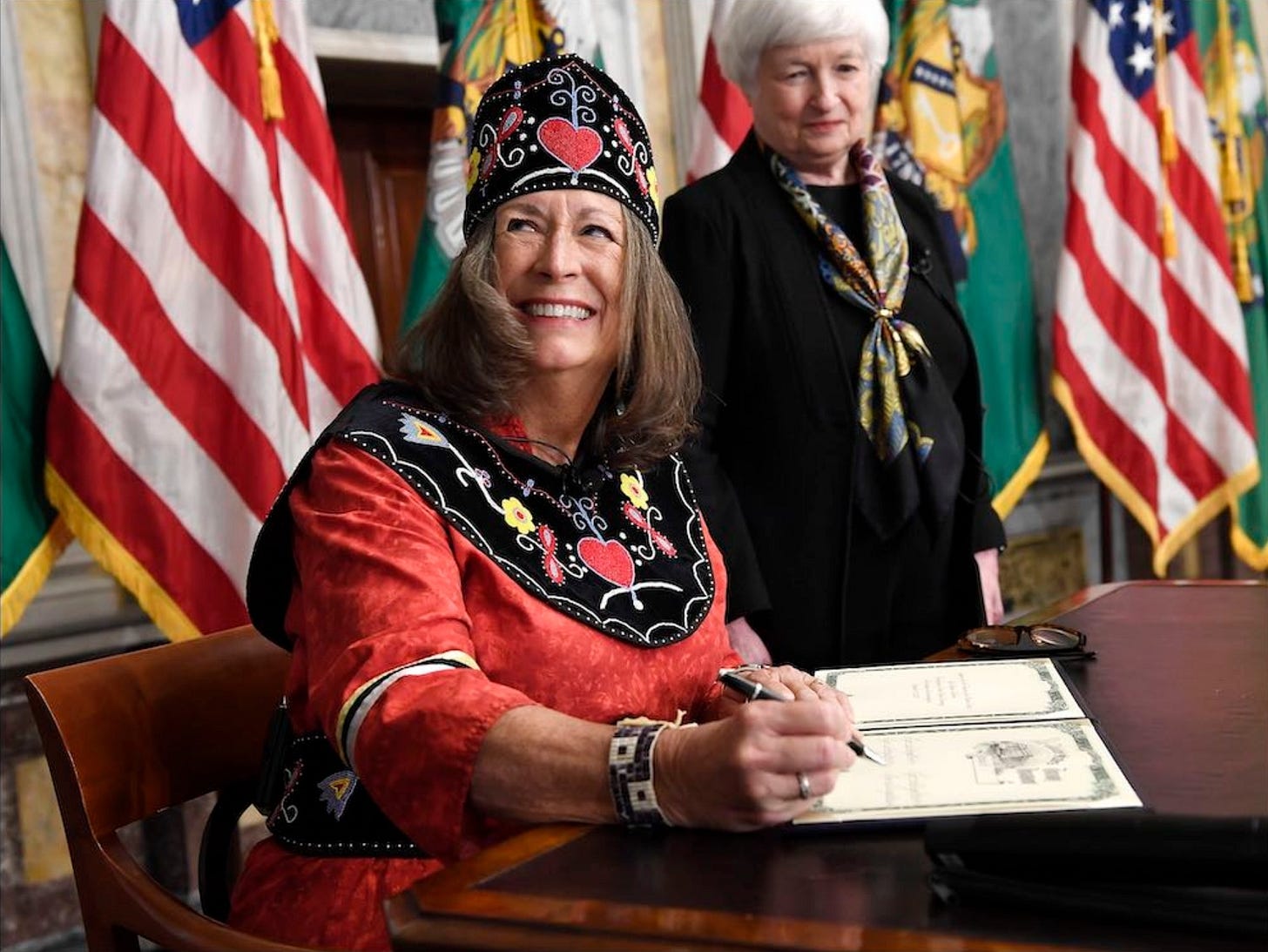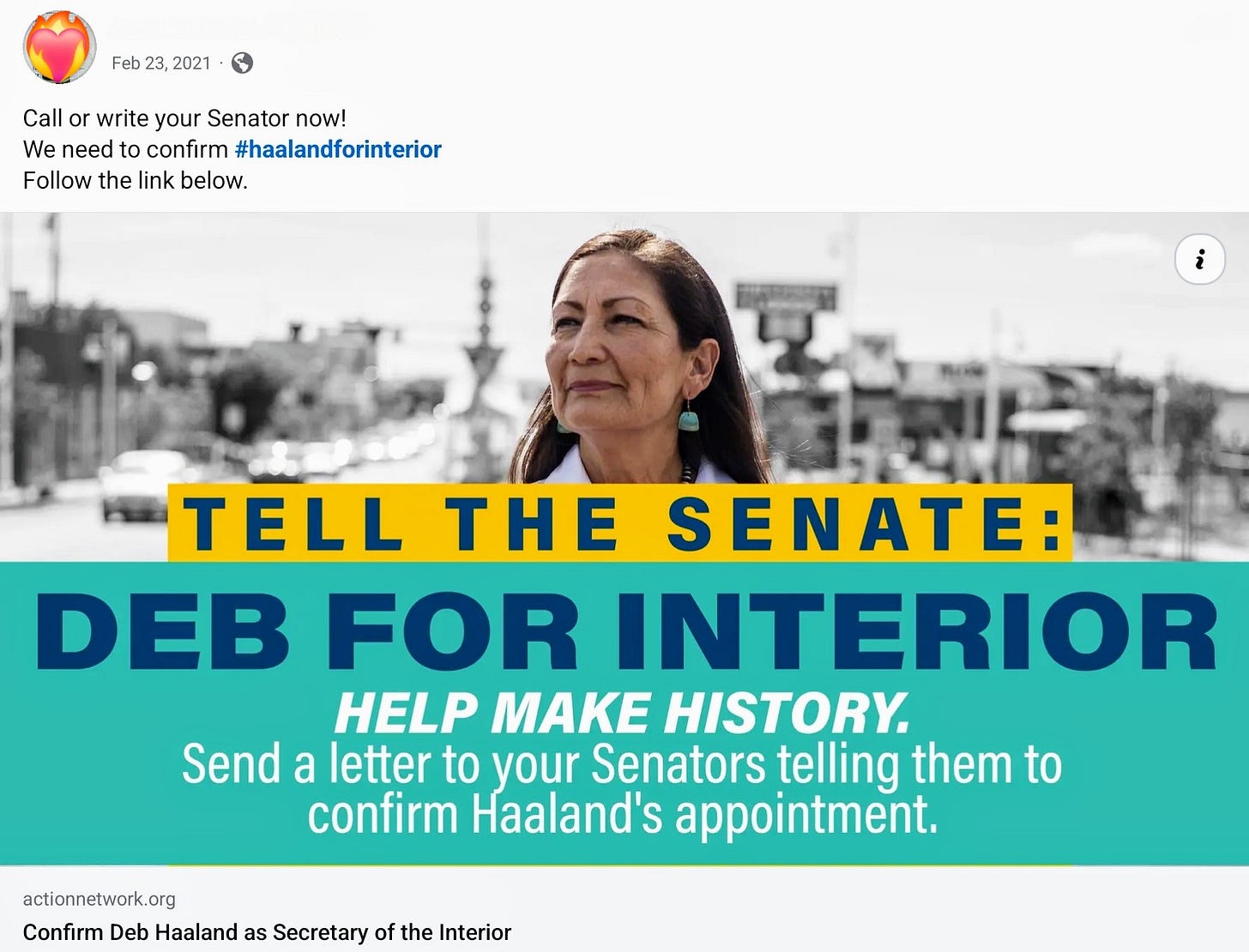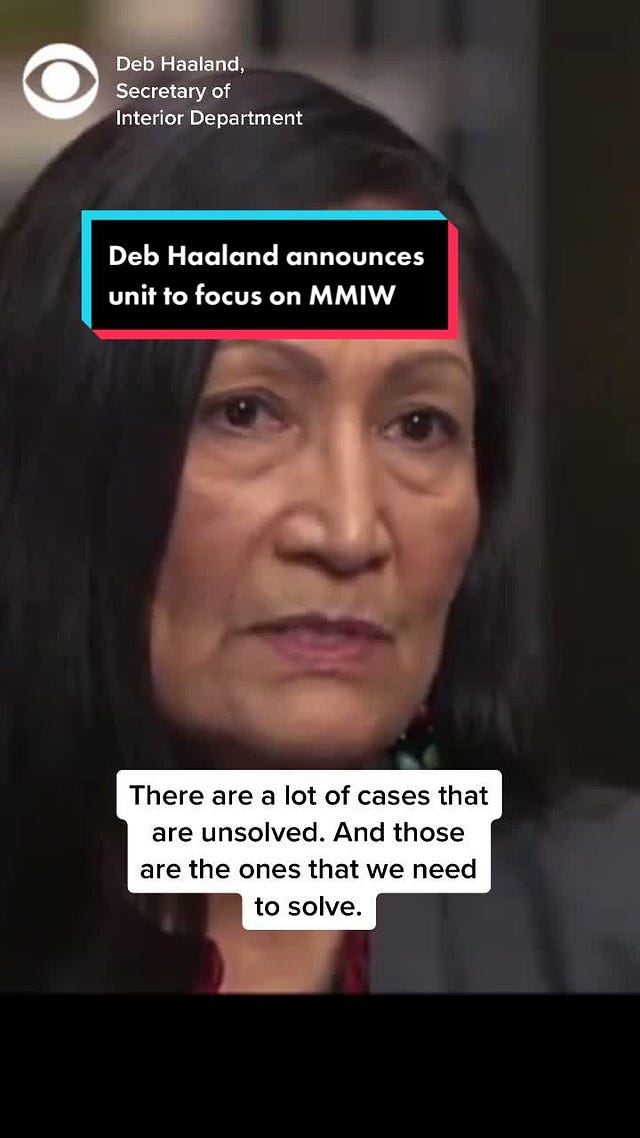President Joe Biden's Impact On NDN Country
The Biden administration enabled, empowered, and enacted historic advancements for Indigenous peoples.

As Joseph Robinette Biden Jr.'s term as 46th President comes to a close, with it ends the most pro-Native presidency in United States history.
When Democratic candidate Joe Biden beat incumbent Donald Trump resoundingly in 2020, he did it with the strong support of NDN Country—a colloquial term for the Indigenous American diaspora—based largely on bold promises Biden made during his campaign.
Now, as many debate the legacy of Biden's administration, it's worth taking a look at the promises he kept to NDN Country, and the important history he made as President, which Donald Trump will never be able to erase.
One of the promises President Biden made during his campaign was to ensure Indigenous peoples had a proverbial seat at the table in his administration.
President Biden vowed to have an administration that reflected the priorities of NDN Country and in fact named over 80 Indigenous appointees to historic positions—including the first Indigenous Treasurer of the United States with Chief Lynn Malerba (Mohegan).
President Biden also appointed a record number of Indigenous American judges when he named four Indigenous women to the federal bench: Lydia Kay Griggsby (Afro-Indigenous), Lauren King (Muscogee Creek), Sunshine Sykes (Navajo), and Sara Hill (Cherokee).
President Biden appointed the first Indigenous American woman to serve as a lifetime judge in Oklahoma and the first Indigenous American lifetime judges of any gender in Maryland, Washington state, and California.
Now half of all Native American lifetime judges in United States history—eight total—have been appointed by President Biden.
Before the Biden administration, only four Indigenous Americans/Alaska Natives—out of thousands—served as lifetime judges. That lack of representation led to a lack of justice for Indigenous plaintiffs and defendants.
It is critical for additional Indigenous judges to be appointed with experience with the specialty of Indian law.
Late Democratic President Jimmy Carter nominated the first Indigenous American judge in 1979—almost 200 years after the birth of the United States. A second wouldn't be appointed until 1994—15 years later—by Democratic President Bill Clinton.
The third would come another 20 years later via Democratic President Barack Obama in 2014 followed by the only Afro-Indigenous judge appointed by a Republican President in 2019.
As of 2024, there has never been an Indigenous American judge on any federal appellate court in United States history—including the U.S. Supreme Court—despite the high volume of cases those courts hear related to federal Indian law.
First Appointed Indigenous American Cabinet Member
Proving to be a man of his word, President Biden provided the best “seat at the table” when he announced in December 2020 that he would nominate New Mexico Democratic Representative Deb Haaland (Laguna Pueblo) to head the Department of the Interior (DOI).
Haaland would be the first-ever Indigenous American to be appointed to a cabinet seat.
As Vice President, Republican Charles Curtis (Kaw Nation) held a position in the cabinet of President Herbert Hoover from 1929-1933, making him the first and only Indigenous American to serve in a cabinet prior to Haaland's appointment.
Having an Indigenous person as Secretary of Interior was significant.
DOI oversees the Bureau of Indian Affairs and is responsible for the management and conservation of most federal lands and natural resources through the Bureau of Land Management, the National Park Service, and other subsidiary agencies. The majority of federal land—including national parks, monuments, forests, and wildlife preserves—is on unceded, treaty-granted, Tribal land.
All of this made Representative Haaland an extremely popular choice in NDN Country, which supported her nomination through online campaigns, calls, letters, and emails to Senators.
Republican Senators drew ire and backlash over their questioning of Haaland and other BIPOC nominees. But she was confirmed by the Senate in March of 2021 by a vote of 51-40.
Under Secretary Haaland's leadership, Charles “Chuck” F. Sams III (Cayuse and Walla Walla) became the first Indigenous American Tribal citizen to be appointed as Director of the National Park Service (NPS), and Dr. Sean MacDuff (Chamorro), the first Indigenous Mariana Islands superintendent of the Mariana Trench monument.
Secretary Haaland—lovingly dubbed “Auntie Deb” by NDN Country—stated “Native American history is American history” which led the DOI to take action to tell the untold or deliberately hidden history of Indigenous peoples in the United States. With Deb Haaland at the helm, the Department of the Interior also began to address its own colonial and racist history.
She launched a theme study at the NPS collaborating with Tribal Nations to focus on the Indian Reorganization Period (1934–1950) to help broaden the understanding of an important chapter in American history and its context within modern public land management.
National parks also reexamined the racist beliefs of John Muir—often dubbed the “father of the national parks.” NPS employees changed park signage to reflect previously untold histories of racism and genocide.
Auntie Deb signed Secretary’s Order 3404 establishing a Derogatory Geographic Names Task Force which reviewed 660 geographic features containing a particularly offensive ethnic, racial, or sexist slur. The task force made recommendations for replacement names.
She also signed Secretary’s Order 3405 establishing a Federal Advisory Committee to address other derogatory geographic names across the federal government.
Steps were taken to more effectively involve Tribal communities in the management of the lands and waters they have stewarded since time immemorial.
In 2022, the DOI announced that for the first time in the agency’s history, it will require formal consultation with the Native Hawaiian community on matters of the rights and sovereignty of Native Hawaiians—a required process for other Indigenous communities that wasn’t previously extended to Native Hawaiians.
In 2023, the DOI increased public land co-stewardship agreements with Tribes from just 20 to 200, the largest-ever increase in history.
Secretary Haaland established the Missing & Murdered Unit with the Bureau of Indian Affairs to ensure cross-departmental and interagency work pursuing justice in the epidemic of missing and murdered American Indians and Alaska Natives.
Secretary Haaland established the Federal Indian Boarding School Initiative to investigate the history of American Indian boarding schools. She launched the “Road to Healing” tour—a years-long effort of travel across the country to give survivors of the federal Indian boarding school system the opportunity to share their stories and be connected with trauma-informed support.
Under the leadership of Assistant Secretary for Indian Affairs Bryan Newland (Chippewa), DOI published findings—Volume I and Volume II—in the Federal Indian Boarding School Initiative Investigation Report.
But none of Auntie Deb Haaland's efforts would have been possible without the full faith and support of the Biden administration.
The Biden administration took action to make Indigenous peoples central to their conservation agenda, including:
restoring and designating multiple new national monuments that honor Tribal Nations by protecting sacred ancestral places and their historically and scientifically important features
designating the first Indigenous-focused national marine sanctuary—Chumash Heritage National Marine Sanctuary
directing federal agencies to support First Foods including healthy and abundant native salmon and steelhead
issuing an updated Sacred Sites MOU and best practices
implementing a first-of-its-kind Indigenous Knowledge guidance.
White House Tribal Nations Summit
In 2021, the Biden administration worked closely with Secretary Haaland to reinstate the White House Tribal Nations summits. These summits were started by President Bill Clinton and occurred annually until they were suspended as soon as President Donald Trump took office.
Held annually since 2021, the summits provide an opportunity for the administration and Tribal leaders from the 574 federally recognized Tribes to discuss ways the federal government can invest in and strengthen nation-to-nation relationships as well as to ensure that progress in Indian Country endures from administration to administration.
At the 2021 Tribal Nations Summit, several agencies and offices—DOI, USDA, HHS, ED, Institute for Museum and Library Sciences, NEA, NEH, DOT, and White House CEQ—signed a Memorandum of Agreement on Native Languages, beginning a new interagency initiative to preserve, protect, and promote the rights and freedom of Indigenous peoples to use, practice, and develop Native languages.
Since 2021, several other agencies have signed on to the MOA including, ACHP, OPM, SSA, SBA, OMB, DHS, DOC, DOL, DOS, VA, AmeriCorps, and EPA. The initiative is a needed one considering the federal government previously deliberately tried to eliminate all languages indigenous to the Americas.
White House Council on Native American Affairs
The White House Council on Native American Affairs was established in 2013 to improve the coordination of federal programs and the use of available federal resources for the benefit of Tribal communities.
It was eliminated by President Trump as soon as he took office, but reestablished by President Biden.
The Council ensured Tribal consultation would guide federal decision-making in addressing the needs of Native peoples.
According to their mission statement:
“Prosperity and resilience for all Tribal nations is the vision of the White House Council on Native American Affairs. The WHCNAA endeavors toward this vision through collaborative inter-agency work across the Executive Branch, regular and meaningful Tribal-Federal engagement, and by fostering an all-of-government approach in meeting treaty and trust obligations to Tribes.”
In 2024 through the WHCNAA, the Biden administration established:
10-year National Plan on Native Language Revitalization
Tribal Treaties Training and Consultation Training Courses for federal employees
Vital Executive Orders And Presidential Memoranda
President Biden used the power of the presidency to aid NDN Country with important initiatives.
President Biden issued three historic Executive Orders that:
reform federal funding to “help live up to the promise of Tribal self-determination”
improve public safety and criminal justice for Indigenous Americans while “targeting the crisis of missing and murdered Indigenous people”
improve educational outcomes and career opportunities for Indigenous American students by “focusing on systemic barriers and increasing access to high-quality education”.
To further address the epidemic of missing and murdered Indigenous peoples, the Biden administration:
signed into law the Violence Against Women Act (VAWA) Reauthorization Act of 2022 which expanded special Tribal criminal jurisdiction over non-Indigenous perpetrators of sexual violence, child violence, stalking, assaults on Tribal law enforcement officers, and sex trafficking on Tribal lands in addition to domestic and dating violence
awarded $68 million in 2023 VAWA grants and more than $85 million in 2024 VAWA grants to support Indigenous communities to provide services and promote justice for survivors
established the Not Invisible Act Commission to improve the federal government’s efforts to address violent crime and the high rates of people reported missing in Indigenous communities.
President Biden also issued two Presidential Memoranda addressing Tribal consultation:
2021 Memorandum on Tribal Consultation and Strengthening Nation-to-Nation Relationships
2022 Memorandum on Uniform Standards for Tribal Consultation.
Putting His Money Where His Mouth Is
For decades, many programs and initiatives have been proposed to address the needs of NDN Country. But the funding to implement such efforts was often not included.
The Biden administration made historic levels of financial investments in NDN Country, including:
$32 billion in the American Rescue Plan, the largest direct federal investment in Tribal Nations in history
$13 billion in the Bipartisan Infrastructure Law to build high-speed internet, roads, bridges, public transit, and clean water sanitation infrastructure in Tribal communities
$700 million in the Inflation Reduction Act to invest in Indigenous communities for climate resilience and adaptation programs, drought mitigation, home electrification, and clean energy development
obligating billions of federal contract dollars—and significant percentages of agencies’ overall procurement dollars—to Indigenous-owned or controlled businesses through the Buy Indian Act.
Improving Regulations To Focus On Tribal Priorities
Part of consultation and nation-to-nation cooperation is meeting the needs of both parties. But in the past, regulations and guidance were designed to benefit the government and colonizers instead of Indigenous peoples.
The Biden administration worked with Tribal Nations to develop regulatory improvements that reflect Tribal priorities including:
revising regulations for economic development opportunities,
revising regulations for the Native American Graves Protection and Repatriation Act (NAGPRA),
increasing transparency for Nation-to-Nation consultation and Tribal Self-Governance,
updating regulations regarding the Indian Reorganization Act for placing land into trust,
proposing updated regulations for petitioning for federal acknowledgment,
updating Class III Indian gaming compacts to increase transparency and provide guidance to Tribes and states,
modernizing Indian Arts and Crafts Act regulations,
revising the Agricultural Leasing regulation to ensure Tribal self-determination is upheld.
A Historic Apology
President Biden stated he “believes that to usher in the next era of the Federal-Tribal relationships we need to fully acknowledge the harms of the past.”
On October 25, 2024, President Joe Biden traveled to the Gila River Indian Community in Arizona with Minnesota Democratic Lieutenant Governor Peggy Flanagan, First Lady Dr. Jill Biden, and Interior Secretary Deb Haaland to issue a formal apology to NDN Country for the government’s Indian Boarding School system.
You can watch Secretary Haaland and President Biden's remarks here:
An official White House statement read:
“For over 150 years, the federal government ran boarding schools that forcibly removed generations of Native children from their homes to boarding schools often far away. Native children at these schools endured physical, emotional, and sexual abuse, and, as detailed in the Federal Indian Boarding School Investigative Report by the Department of the Interior (DOI), at least 973 children died in these schools.”
“The federally-run Indian boarding school system was designed to assimilate Native Americans by destroying Native culture, language, and identity through harsh militaristic and assimilationist methods.”
“In making this apology, the President acknowledges that we as a people who love our country must remember and teach our full history, even when it is painful. And we must learn from that history so that it is never repeated.”
The apology was long overdue, but necessary.
During a time when certain government factions are doing everything to whitewash U.S. history to spare the feelings of the White majority, such an acknowledgment is more important than ever.
Biden's Legacy In NDN Country
During the last White House Tribal Nations Summit in December 2024, President Biden was awarded a “Lightning And Thunder” wool blanket—designed by artist Pat Pruitt (Laguna Pueblo)—from the Snoqualmie Tribe-owned Eighth Generation lifestyle brand.

Embroidered on the blanket was:
“Joe Biden, Champion for Indian Country, 2021-2024”
The relationship between NDN Country and the United States government has been plagued by violence and racism. The most popular Presidents in our nation's history had very different legacies with this land's original inhabitants and their descendants.
But the Biden administration can be counted as an example of how to coexist with a spirit of mutual respect and cooperation.
So in all of my languages:
Philámayaye, Tuŋkaŋŝilayapi Biden (Lakȟótiyapi).
Niawen'kó:wa, Hoyaneh Biden (Kanien'kéha).
Merci, Chef du Pays Biden (Metís).
Thank you, President Biden (English).
Sincerely,
Šung'mánitu Ápé / Nikakwaho'tá':'ah Wá’tsik / Amelia
~~~~~~~~~~















"Leonard Peltier" is many allies and Indigenous peoples response to anything acknowledging the historic advancements made for NDN Country during the Biden administration.
My parents were contemporaries and knew many of the AIM leaders. My Akenistén:’a (Mother) was not a fan of their deeply patriarchal, misogynistic, toxically masculine, sexist, domestically abusive leadership. Despite being from matrilineal/matriarchal cultures, women in AIM were relegated to being caretakers and/or glorified sex toys unworthy of a voice or opinion or safety or justice.
I neither oppose nor support the freedom of Leonard Peltier. I simply do not comment on it. I didn’t forget to include him in this piece.
If you'd like to know why, watch the documentary series "Vow of Silence: The Assassination of Annie Mae"—it's on HULU and Disney+—or Google "Annie Mae Pictou Aquash."
This piece is not about Leonard Peltier and as an Indigenous woman, I disagree with prioritizing one man over the many millions who are aided by these accomplishments. Philámayaye, Niawen'kó:wa, Thank you 💛🤍🖤❤️
Thank you so much for providing this comprehensive summary of all that President Biden has done for Indian Country. I only wish his legacy was going to be carried forward, but I fear the incoming regime won't. People who can't handle the full history of our country, warts and all, don't really love this country. They only love the sanitized Disney version of it. The history of Native Americans is the history of this country, and it should be honored and respected.